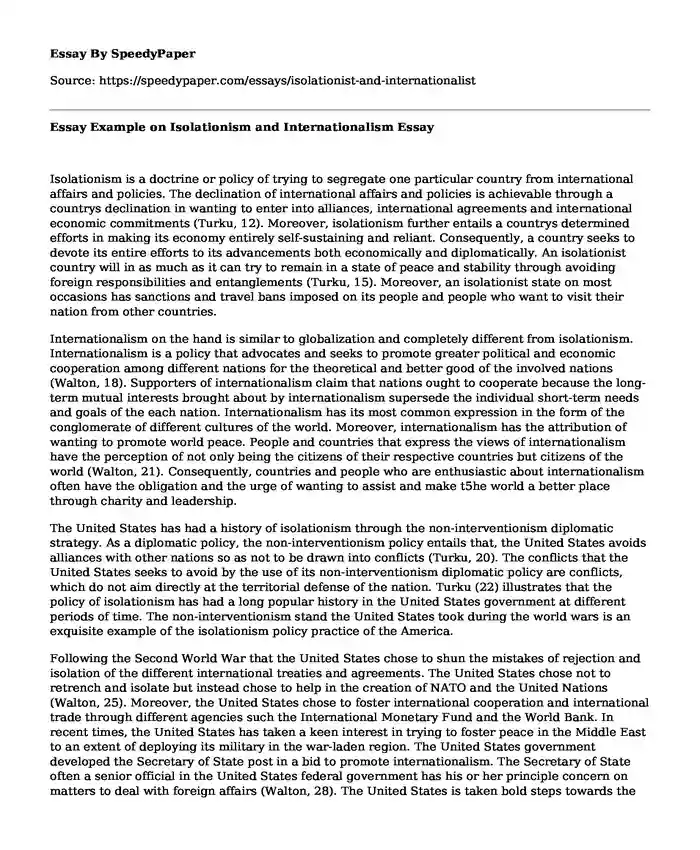
| Type of paper: | Essay |
| Categories: | Globalization Policy International relations |
| Pages: | 3 |
| Wordcount: | 616 words |
Isolationism is a doctrine or policy of trying to segregate one particular country from international affairs and policies. The declination of international affairs and policies is achievable through a countrys declination in wanting to enter into alliances, international agreements and international economic commitments (Turku, 12). Moreover, isolationism further entails a countrys determined efforts in making its economy entirely self-sustaining and reliant. Consequently, a country seeks to devote its entire efforts to its advancements both economically and diplomatically. An isolationist country will in as much as it can try to remain in a state of peace and stability through avoiding foreign responsibilities and entanglements (Turku, 15). Moreover, an isolationist state on most occasions has sanctions and travel bans imposed on its people and people who want to visit their nation from other countries.
Internationalism on the hand is similar to globalization and completely different from isolationism. Internationalism is a policy that advocates and seeks to promote greater political and economic cooperation among different nations for the theoretical and better good of the involved nations (Walton, 18). Supporters of internationalism claim that nations ought to cooperate because the long-term mutual interests brought about by internationalism supersede the individual short-term needs and goals of the each nation. Internationalism has its most common expression in the form of the conglomerate of different cultures of the world. Moreover, internationalism has the attribution of wanting to promote world peace. People and countries that express the views of internationalism have the perception of not only being the citizens of their respective countries but citizens of the world (Walton, 21). Consequently, countries and people who are enthusiastic about internationalism often have the obligation and the urge of wanting to assist and make t5he world a better place through charity and leadership.
The United States has had a history of isolationism through the non-interventionism diplomatic strategy. As a diplomatic policy, the non-interventionism policy entails that, the United States avoids alliances with other nations so as not to be drawn into conflicts (Turku, 20). The conflicts that the United States seeks to avoid by the use of its non-interventionism diplomatic policy are conflicts, which do not aim directly at the territorial defense of the nation. Turku (22) illustrates that the policy of isolationism has had a long popular history in the United States government at different periods of time. The non-interventionism stand the United States took during the world wars is an exquisite example of the isolationism policy practice of the America.
Following the Second World War that the United States chose to shun the mistakes of rejection and isolation of the different international treaties and agreements. The United States chose not to retrench and isolate but instead chose to help in the creation of NATO and the United Nations (Walton, 25). Moreover, the United States chose to foster international cooperation and international trade through different agencies such the International Monetary Fund and the World Bank. In recent times, the United States has taken a keen interest in trying to foster peace in the Middle East to an extent of deploying its military in the war-laden region. The United States government developed the Secretary of State post in a bid to promote internationalism. The Secretary of State often a senior official in the United States federal government has his or her principle concern on matters to deal with foreign affairs (Walton, 28). The United States is taken bold steps towards the revamping of its internationalism status with is recent lifting of the sanctions and the embargo on Cuba.
Works cited
Turku, Helga. Isolationist States in an Interdependent World. Farnham, England: Ashgate, 2009. Print.
Walton, Whitney. Internationalism, National Identities, and Study Abroad: France and the United States, 18901970. Palo Alto: Stanford University Press, 2009. Print.
Cite this page
Essay Example on Isolationism and Internationalism. (2020, Feb 19). Retrieved from https://speedypaper.net/essays/isolationist-and-internationalist
Request Removal
If you are the original author of this essay and no longer wish to have it published on the SpeedyPaper website, please click below to request its removal:
- Free Essay on Oscar Wilde Aesthetic
- Free Essay with a Persuasive Speech on Recycling
- Essay Sample on Common Causes for Projects Failure
- Essay Example on Why Psychology Is Not a Science
- Human Resource Functions Described in This Free Essay
- 5 Effective Green Marketing Strategies: Essay Sample
- Free Essay: Animal Food Manufacturing Industry Analysis
Popular categories




